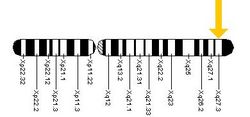Fragile X Syndrome
Fragile X syndrome (FXS) is a X-linked genetic disorder, which is connected with the mutation of FMR 1 gene. Patients, who suffer from FXS have intellectual and also physical disability, which influence their life seriously. Because of the connection to X-chromosomes, it is clear, that especially male are affected more often and their symptoms are worse. The premutation of FMR 1 gene leads to FXTAS (Fragile X-associated Tremor/Ataxia Syndrome).
Etiology and Pathogenesis[edit | edit source]
The disorder is connected with changes of FMR 1 gene, especially with the amount of CGG triplets:
- Healthy people – under 50 repeats
- Premutation (FXTAS) – from 50 to 200 repeats
- Full mutation (FXS) – over 200 repeats
In people, who have more than 200 CGG repeats on their X-chormosome, we can find a specific methylation, which turns off the gene. The result is a lack of fragile X protein (FMRP).
Symptoms[edit | edit source]
- Mental retardation – learning disabilities, intellectual skills
- Typical facial features – long face with big ears and sensitive skin
- Macroorchidism – after puberty
- Behavioral disorders – aggression, autism
Diagnosis[edit | edit source]
Althought the early diagnosis is necesarry if we want to eliminate serious disabilities, there are just few sings, which can help us to make a right diagnostic conclusion. In babies with FXS we can find larger head circumferences. Facial features and macroorchidism become more prominent during adolescence, when it is usually little bit late to influence mental disorders.
Much more important seems to be the area of molecular diagnostics and also family history can help us very much. Children with FXS have usually some relative (grandparents or parents), who suffer from FXTAS. FXTAS is a premutation syndrome, which can be inherited to the next generation. When premutation start to expand CGG triplets (over 200 repeats), carriers then develop fragile X syndrome. We have to search for FXS in the families where FXTAS have appeared.
Therapy[edit | edit source]
Nowadays, there is no specific treatment of FXS, althought we know a lot about the etiology. There are many researches, which maybe in future can lead to the discovery of some molecular based treatment.
In the meantime we can only minimize the symptoms. The early intervention is necesarry because of brain damage prevention. Individualized school plan can help children to improve their intellectual skills. The team of psychologists and special teachers can cooperate with a small patient´s parents. Speech and occupational therapy is also required. Our medication options are poor, but we should combinate them with the other types of therapy. We use antidepressants, anxiolytics, psychostimulants.



